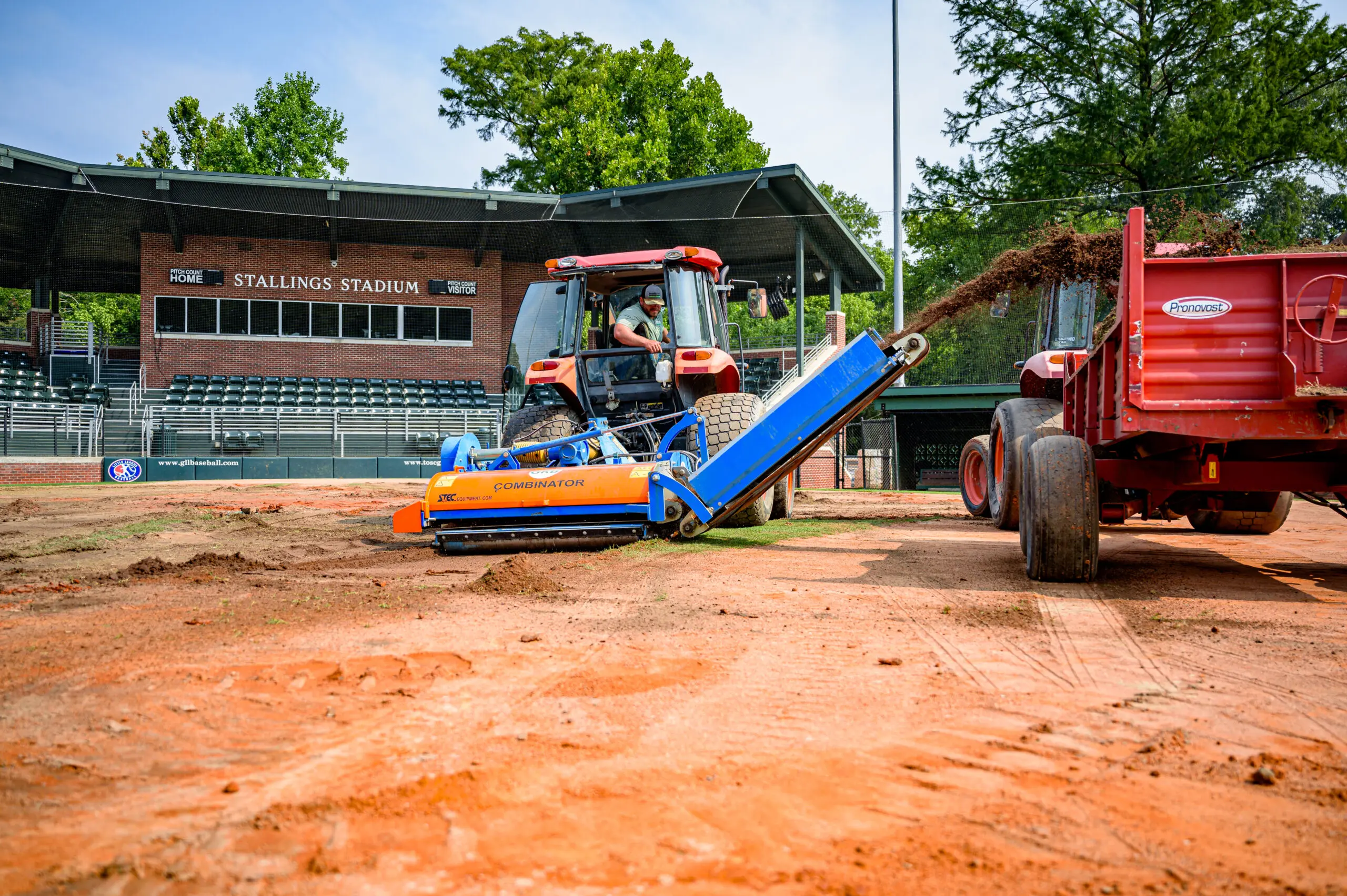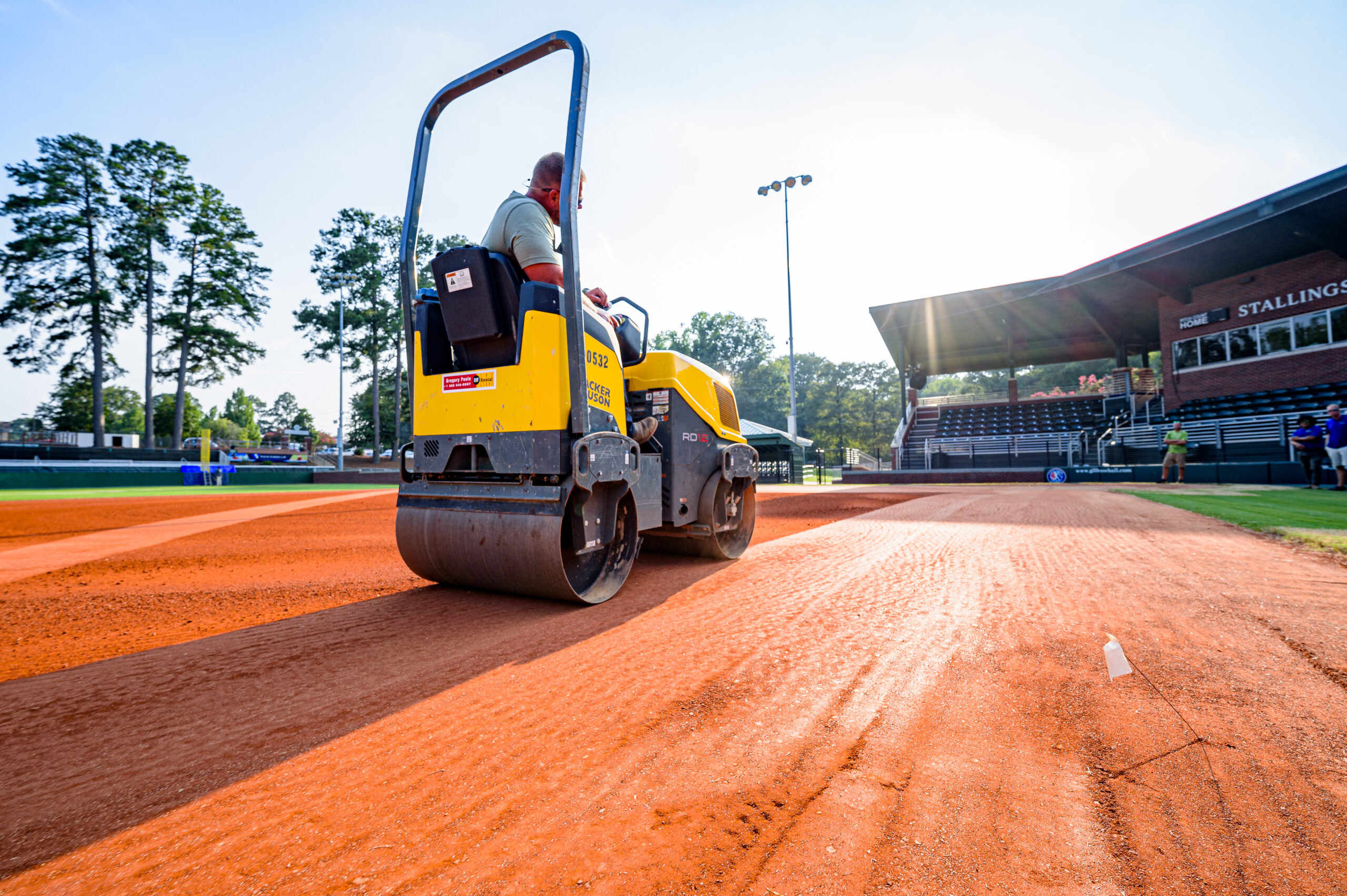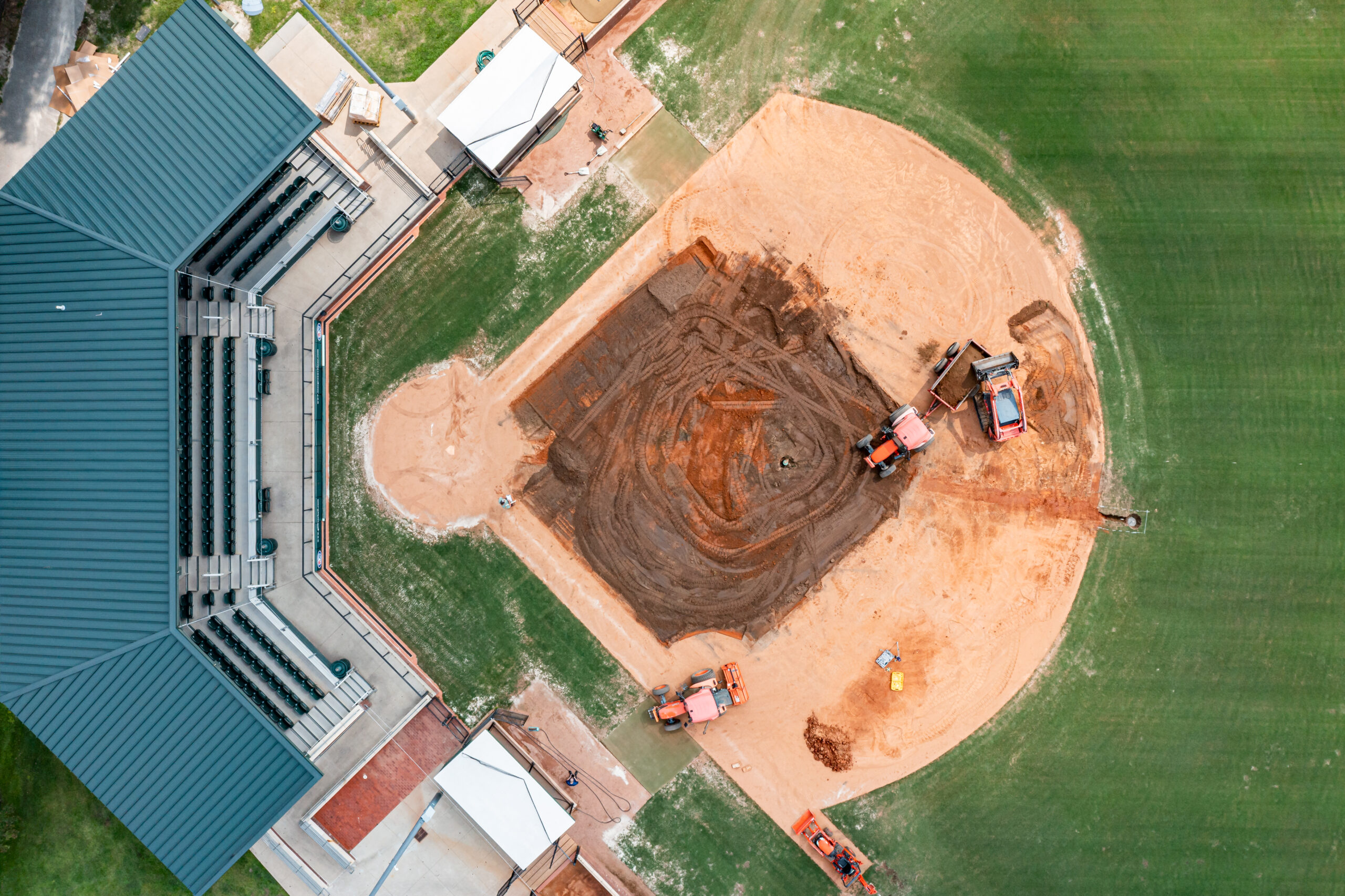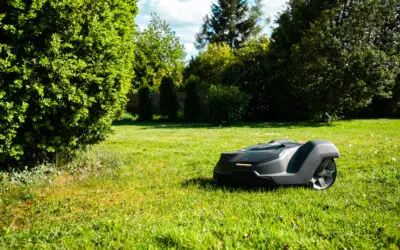Keeping Fields Game-Ready: Q&A With Eastern Turf Maintenance
Eastern Turf Maintenance was founded in 2000 by Brad and Ann Sutton, starting with zero customers. They quickly grew to serve 10,000 customers in the Raleigh area before selling part of the business to a private equity firm. Today, they service over 4,000 customers in Greenville, New Bern, the Crystal Coast, and Wilmington. They also maintain around 100 athletic fields across various institutions and locations. We recently talked with Brad about the unique challenges of athletic field upkeep and maintenance.
RealGreen: How did you first get involved in working on athletic fields?
Brad Sutton: I had a contact at East Carolina University who had just gotten a job as groundskeeper, and he reached out to me saying he needed some help getting their fields turned around. It was just me in the field; I started out only doing fertilization and weed control because that’s the only equipment I had.
After a few years, I heard from some friends at North Carolina State, who explained that they were paying an out-of-town company to do deep tine aeration, top dressing and things like that — they asked me, “Why don’t you get into this?” My reply was: “If you give me the job, I’ll go buy the equipment.”
 RG: How did you learn the nuances of treating athletic fields versus regular lawns and green spaces?
RG: How did you learn the nuances of treating athletic fields versus regular lawns and green spaces?
BS: Mostly, treatments on athletic fields are just like treating lawns. It’s a little more high profile, but there are many similarities; you’re just doing a bigger area all at once. But when it comes to the heavy maintenance on them, the deep tine aeration and top dressing — I had watched guys do it before, and knew others who did it, but there was still a learning curve. Not so much about operating the equipment, but more just anticipating problems: What do you do if something goes wrong? If something breaks down?
For example, the first time I went to do deep tine aeration at UNC Chapel Hill, the machine broke down four times on one field. I had to learn a lot on a couple of pieces of equipment and how to deal with them fast. With a major university field, you don’t have a week to take care of it. You need to do it that day: they have people coming back out to practice or play. In the beginning, that was stressful. Now, it doesn’t stress me out the way it used to.
RG: After starting with ECU and NC State, how has your athletic field business grown?
BS: We have five full-time people in the field who do the work every day. We have more than 100 fields we look after, including NC State, University of Carolina, Duke, East Carolina and many smaller colleges. We also work with many municipal parks and rec departments and public high schools.
RG: How is scheduling for athletic facilities different from standard lawn care scheduling — frequency, getting in and out on time, odd hours, etc.?
BS: Really, it’s all of the above.
We usually do about seven applications a year on these fields, focusing heavily on straight fertilizer with less emphasis on weed control. We overseed them with perennial ryegrass in the fall.
The scheduling can be tricky, but the maintenance hours aren’t as crazy until we start deep tine aeration and top dressing. We complete much of that work in a one-month window, typically June through early July, when we work 80-hour weeks due to the short timeframe.
For fertilizer applications, we adjust our scheduling as needed. Sometimes we work weekends, and during certain times of the year, we shift our work week entirely since the fields are empty on weekends and we can work uninterrupted.
When we have major renovation jobs, like when we have removed and re-sodded fields at NC State or East Carolina, those are intense periods. We start and don’t stop until completion — sometimes working 20 hours before getting a break. Similarly, when we help with changeovers for concerts and events, the work is non-stop until finished. It all happens at once.
 RG: What do you appreciate most about working in this arena?
RG: What do you appreciate most about working in this arena?
BS: It can be profitable. But we’ve got really good people working with us, and that’s what keeps me in it. I enjoy this part of the business because I get to ride a tractor, which can be almost meditative. Sometimes, nobody can reach you for three or four hours — it’s just the hum of the tractor. You’re not talking to people, you’re just working. That has always been very satisfying to me.
I used to personally spray many of these fields. About 20 years ago, when fewer games were televised, we had a special approach for games scheduled for national television. We would apply a mix of iron and nitrogen at places like NC State or East Carolina, especially for night games. It would make the turf intensely green, and the field managers would mow it to perfection.
It was always thrilling to either be there in person, looking at the field when the lights came on and the stadium was full, or watching it on national TV and thinking, “Hey, we helped make that grass that green.” Now, with people commenting about it online through text messages and Instagram, it’s really rewarding to see them say, “They have great looking fields.”
RG: Can you tell us about a game that you’re especially proud of?
BS: Absolutely. The first time I ever worked on East Carolina’s field, they had been without field managers for a while. When I showed up, the field was yellow. The athletic director took me to his office, turned around and said, “I’m really worried about this field.” I told him, “I’ll be back tomorrow and we’ll turn this thing around.”
For their first home game that year, they played Virginia Tech, with the famous quarterback Michael Vick. East Carolina wasn’t used to having an attractive field, and everyone was standing around talking about how green the grass was. That was really satisfying, especially because it wasn’t even difficult — it was just applying the same techniques we use on home lawns, adding proper fertilizer and having the field manager mow it regularly.
I’ve always enjoyed showing up to a home lawn or athletic field that was yellow or starving for nutrition, applying liquid nitrogen, and having people say, “Wow, he’s a magician.” I’m not really, but I love working on lawns or fields that don’t look good initially, where I know I can make improvements that will make people think I’m a genius.
 RG: What would you say to someone who wants to get into athletic field care and maintenance in their service area?
RG: What would you say to someone who wants to get into athletic field care and maintenance in their service area?
BS: I would tell someone you better make sure you know what the heck you’re doing when it comes to treating grass if you’re going to take on athletic fields. Because mistakes happen, and you don’t want them happening on something high profile.
For years, I wouldn’t let anyone but myself spray the fields at NC State; I mean, you go out there on Wednesday and Saturday, and there are 60,000 people looking at what you did. If you mess up, it’s not going to be good.
So my advice would be, don’t out-punt your coverage. Don’t bite off more than you can chew. Get into it for the right reasons.
RG: How would you say RealGreen has helped you as a company?
BS: You know, I’ve seen some weird software systems when we’ve been out there acquiring other companies. Not RealGreen. It’s excellent for managing the day-to-day maintenance operations because it structures our program. We used to have an old-school approach, but now we have it much more refined. We’ve told clients exactly what we’re offering: a seven-application yearly program with overseeding, deep tine aeration and top dressing. The system helps us track all of this, and the larger your operation grows, the more valuable this tracking becomes.
RealGreen is truly impressive. Thirty years ago, the company I worked for tried to develop a similar system itself. I initially purchased RealGreen after discovering it in a landscaping magazine during their early days when it was a small team. After seeing a demonstration, I immediately thought, ‘That’s exactly what we were trying to build, but it’s already available!’ I knew we needed it, especially coming from managing 14,000 customers using route cards and statement cards.
Since implementing RealGreen, it’s been remarkable. People often say nothing’s perfect, but RealGreen is the best solution I’ve seen for lawn care operations.
Thank you to Brad Sutton and Eastern Turf Maintenance for sharing their story with us! Ready to learn more about how RealGreen can help you grow your business and branch out into new service areas? Click the button below to schedule a demo and get started.



